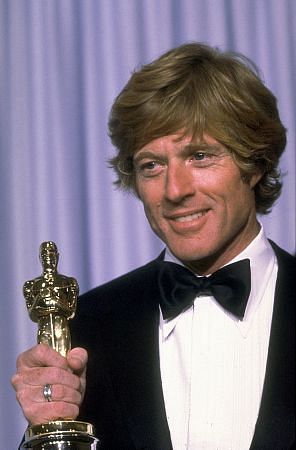|
Robert Redford
Scroll down for movie list.
Biography from Leonard Maltin's Movie Encyclopedia:
This blond, square-jawed leading man combined good looks with genuine intelligence and unmistakable charisma to become one of the 1970s' true superstars. Certainly he owed much of his popularity to the female filmgoers who flocked to see him in the likes of The Way We Were (1973) and The Great Gatsby (1974), but Redford's appeal-like that of most great movie stars-cuts across gender lines. As a youth he won a baseball scholarship to the University of Colorado but dropped out to go to Europe; upon returning to the States, he settled in New York and took up acting. He scored in the original Broadway production of Neil Simon's "Barefoot in the Park," did a lot of television, and made his film debut in War Hunt (1962), a minor antiwar drama.
He started winning bigger-and betterparts in films like Inside Daisy Clover (1965), This Property Is Condemnedand The Chase (both 1966), but he took a giant step toward stardom in the movie version of Barefoot in the Park (1967, opposite Jane Fonda) and nailed it with his irresistible performance opposite Paul Newman in Butch Cassidy and the Sundance Kid (1969). It immediately became apparent that Redford was not one to trade on his "pretty-boy" looks and charisma, as he sought out challenging and intelligent film projects, from Downhill Racer and Tell Them Willie Boy Is Here (both 1969) to The Candidate (1972), a film that in fact exploited his looks in a mordant satire of modern-day political campaigns.
That film seemed to launch Redford on a winning streak. In 1973 he reteamed with Paul Newman for the con-artist comedy The Sting (for which he earned his first Oscar nomination) and struck boxoffice gold opposite Barbra Streisand in The Way We Were He produced and starred as "Washington Post" journalist Bob Woodward in All the President's Men (1976), which enabled him to combine his political interests with mainstream moviemaking. In 1980 he moved behind the camera to make his directing debut with Ordinary Peoplea highly charged domestic drama, and won an Academy Award for his efforts.
That film marked a watershed in his career, as he became choosier about acting assignments, and devoted more time to political causes, environmentalism, and the establishment of The Sundance Institute in Utah, a year-round workshop for burgeoning filmmakers. He took occasional movie leads-as in The Natural (1984), Out of Africa (1985), and Legal Eagles (1986)-but he clearly put his starring career on the back burner. In 1988 he directed his second feature, The Milagro Beanfield War After four years offscreen Redford made a starring "comeback" in Havana (1990), a romantic drama with Casablanca pretensions, but it was a costly flop, in spite of good personal reviews. It was one of his few outright failures with longtime collaborator Sydney Pollack, who worked with him as an actor in War Hunt (1962) and directed him in This Property Is Condemned, Jeremiah Johnson (1972), The Way We Were, Three Days of the Condor (1975), The Electric Horseman (1979), and Out of Africa
In 1992 he made a conscious decision to put his career back in high gear, and enjoyed great success on every front. Sneakers proved he had lost none of his star power (or his light comedy touch); A River Runs Through It revealed his strengths as a director; and Incident at Oglala which he executive-produced and narrated, reaffirmed his social commitment. Then in 1993 he defined charisma (and box-office clout) as the sexy millionaire who offers Demi Moore a million dollars to sleep with him, in the smash hit Indecent Proposal He earned Oscar nominations for directing and coproducing the intelligent, superbly crafted Quiz Show (1994). |  |










